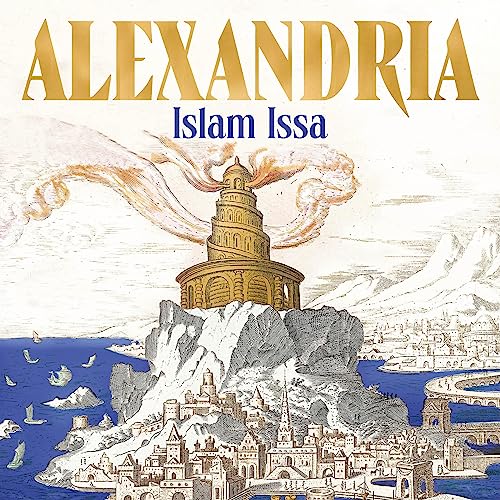Alexandria by Islam Issa published by Hodder & Stoughton
If you want a read for Christmas, this is a good buy.
I listened to it on audiobook, read by the author, and his passion came through.
The book is packed with facts that show you how important Alexandria was in world history.
Alexander decided to found the city on a small island on the coast of Egypt. The reason was its perfect situation on the routes to three continents; it was especially open to the Indian Ocean and thus both India and China.
He decided to build the Pharos, the first purpose-built lighthouse anywhere; this ended up being one of the seven wonders of the world.
Perhaps more importantly, he established the most important library in the world, with more than a million books. It became an international centre of study and research for scholars.
Each section of this establishment was named after a muse, e.g. Hygieia for medicine.
Together, these formed the world’s first museum in 300 BC. The roads were to be wide, and the first through-city road built then is now the oldest road in continuous use.
Alexander then went off to fight and left his architect to construct the city. His great legacy was that knowledge was the most important thing.
Although he never saw the city, his work was continued by his successors, his right-hand man, who set up the Ptolemy Dynasty (1-4).
Scientists and writers were invited from all over the world. They were fed and housed. Most important, there was no sectarianism, so Jews and polytheists, as well as Christians and Muslims later on.
This period in Alexandria has to have been the greatest burst of scientific knowledge in history.
In the period 300 BC to 200 CE, geometry was invented. It was worked out that the Earth orbited the Sun, 1400 years before Galileo. A steam engine was invented, along with a vast array of other things that were then conveniently forgotten. They developed Greek and pre-Greek maths, which was later picked up in Europe. They developed a great deal of medicine; in fact, Cleopatra the 5th wrote a book on medicine. (All the Ptolemaic queens were called Cleopatra.)
The Hebrew Bible was translated into Greek so that Jews, who could only speak Greek, could understand it.
There were always Jews in the city, not oppressed in any way, as well as Greeks, Italians, and Egyptians. This was genuinely the world’s first big multicultural city. It soon became one of the world’s great cities, trading huge quantities of wheat, papyrus, and other goods to the Roman Empire. But knowledge was its key export.
St Mark came there in the 4th century and founded one of the world’s first Christian churches. In the 10th century, Venetian merchants stole his body, and it is in St Mark’s Basilica there, without its head.
But the advantage of its trading position also had the disadvantage that natural disasters, floods, earthquakes, and worst of all plagues came in on the ships. They did develop a system of quarantine, and they had a lot of medicine, but the city was often decimated. It was also the target of the Crusades and imperial ambitions from other powers, but it survived them all.
Over the years, there have been many challenges to multiculturalism. The Catholic Church was one of the worst sectarian protagonists. There were different forms of Islam; the Mamluks controlled Egypt for a long time, for example. There were the Romans, Napoleon, and the British. Zionism had a base which included Jabotinsky, a revisionist Zionist leader, author, poet, orator, soldier, and founder of the Jewish Self-Defence Organisation in Odessa.
In the Six-Day War, Alexandria was bombed by Israel, which caused a further reduction in the Jewish population to almost nothing, from being nearly half in classical times.
Nasser made his most important speeches in the city, including the announcement of the nationalisation of the Suez Canal.
In the Arab Spring, more than 1 million people took over the streets.
This city has a truly amazing history and Islamic monuments. Both the first railway in Africa and the first film shows (the Lumiere brothers came two years after they first showed in Paris) started there.
Issa gives detailed descriptions of the great scientists, artists, poets, and political leaders. He often personally knew some of them. He is truly a citizen of the city, which has today a population of 6 million, and 60% of Egypt’s industrial production is situated there.
A gripping read about a city just as important historically as the better-known European centres.
Art (47) Book Review (102) Books (106) Capitalism (64) China (74) Climate Emergency (97) Conservative Government (90) Conservative Party (45) COVID-19 (43) Economics (36) EcoSocialism (48) Elections (75) Europe (44) Fascism (52) Film (47) Film Review (60) France (66) Gaza (52) Imperialism (95) Israel (103) Italy (42) Keir Starmer (49) Labour Party (108) Long Read (38) Marxism (45) Palestine (133) pandemic (78) Protest (137) Russia (322) Solidarity (123) Statement (44) Trade Unionism (132) Ukraine (324) United States of America (120) War (349)


